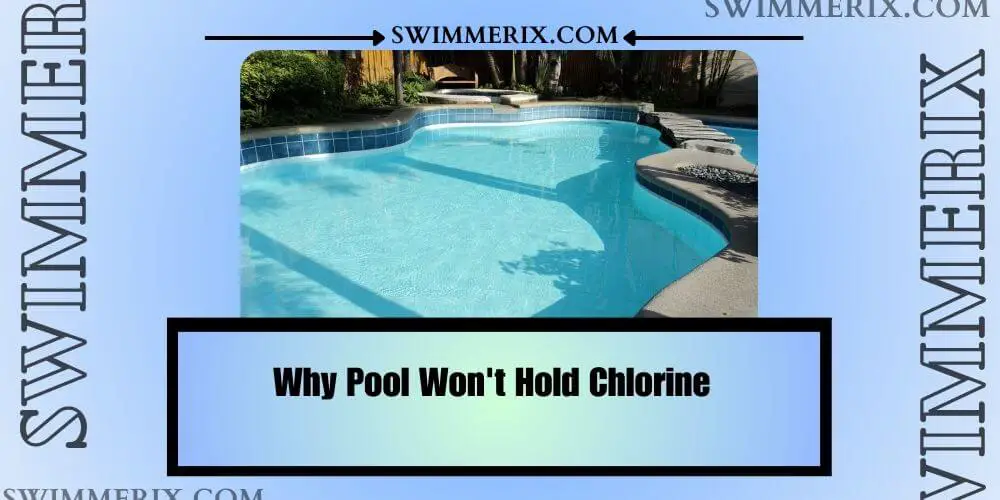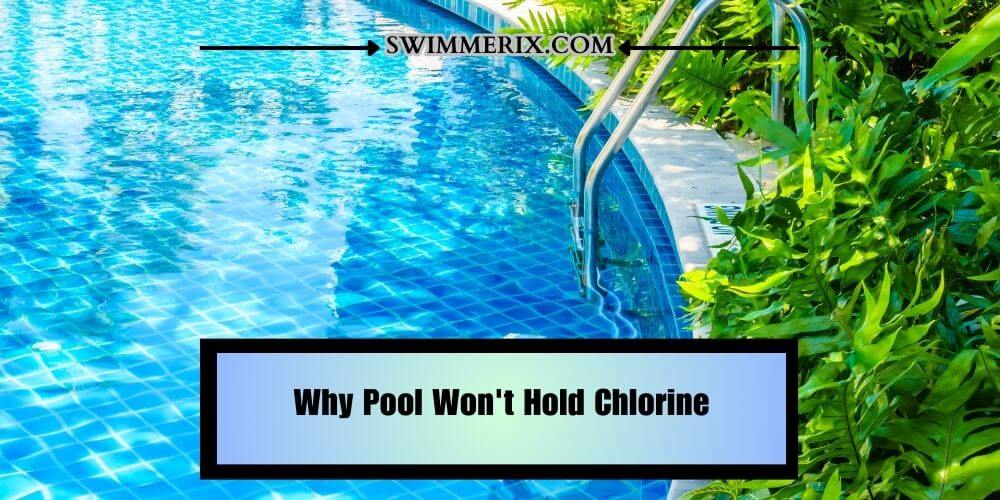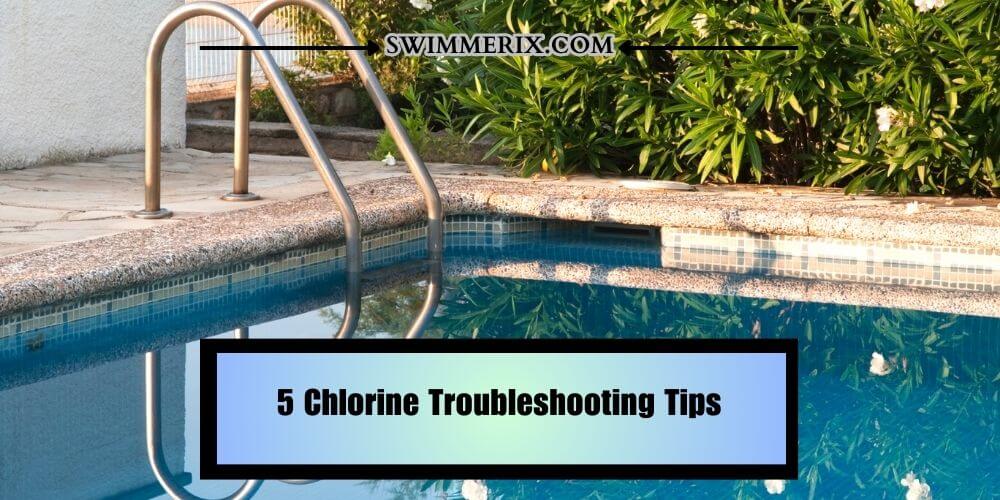
Chlorine is very important to sanitize the Water and eliminate harmful bacteria & algae from pool water. However, if your pool doesn’t hold chlorine, it can be quite a concerning & frustrating issue.
Pool not holding the chlorine is one of the most common issues many pools face. Therefore, if you want to know why your pool won’t hold chlorine, this is the article for you. Here, you will learn why your pool struggles to retain chlorine and some practical solutions to help you achieve crystal-clear Water.
Whether you are a new pool owner or a seasoned enthusiast, understanding and addressing this issue will ensure a clean & enjoyable swimming experience. No doubt that a streaming swimming pool provides a refreshing escape during hot summer days, but maintaining that cleanliness & safety requires proper care.
One of the essential parts of maintaining a pool is adding chlorine to sanitize the Water. Since chlorine is a powerful disinfectant that keeps the Water safe & hygienic for swimming, let’s find out why your pool won’t hold chlorine & what you can do about it.
Why Pool Won’t Hold Chlorine

If the pH level of your pool is too high, the chlorine will be less effective. In addition, too high or too low alkalinity can destabilize the pH level, leading to pool chlorine efficiency. Another reason your pool is not holding chlorine can be due to contaminants and inadequate filtration & circulation. To determine the culprits assess your pool water condition & test its water parameter to find the best course of action.
When you add chlorine to the pool, it undergoes a chemical reaction that produces hypochlorous acid. This kind of acid is responsible for killing bacteria, viruses & harmful microorganisms that contaminate the Water.
In addition, chlorine also helps control algae growth while preventing the pool from turning green. Therefore, you must strike the ideal chlorine level in your pool for its effectiveness as a sanitizer.
APEC Water Systems say the recommended range for chlorine in the pool tends to be between 1.0-3.0 parts per million (PPM). This range ensures your Water remains safe and free from harmful organisms.
However, if your pool is struggling to hold chlorine, many underlying causes can be at play. Below are the most common cause factors & their appropriate solution for a pool not holding chlorine.
Related Topic: How Long Can Water Sit in a Pool Without Chlorine
3 Common Causes for a Pool Not Holding Chlorine
Poor Water Balance
Imbalanced pH Levels
The first thing you need to do is get a reliable testing kit from a local pool supply store and test the water perimeter, especially the pH level. You should know that the pH level can affect the effectiveness of chlorine to different degrees.
If the pH level is very high, the chlorine will likely be less active, reducing sanitizing power. On the other hand, if the pH level is very low, the chlorine will start to dissipate rapidly. Therefore, you must maintain proper pH levels by paying attention to regular testing.
If you find that the pH is outside the recommended range, adjust it accordingly with the help of a pH increaser like sodium carbonate to raise the pH, or you can use a pH reducer like sodium bisulfate to lower it.
Related Topic: How to Raise pH Without Raising Alkalinity
Total Alkalinity Imbalance
The total alkalinity refers to the ability of your pool water to resist changes in pH level. When you find the total alkalinity too high or too low, it destabilizes the pH level, further leading to chlorine efficiency.
Therefore, ensure you keep the alkalinity level in the recommended range. For most pool experts, advice is to keep the alkalinity level ranging between 80-120 PPM. If you think your Water’s total alkalinity is above this range, use uric acid to bring it down.
Uric acid is an effective alkalinity reducer, but also test the Water before & after applying it. On the other hand, if the total alternate is very low, I suggest you add an alkalinity increaser, like sodium bicarbonate, to stabilize it.
Presence of Contaminants
High Cyanuric Acid (CYA) Levels
Regarding outdoor pools, it is important to use cyanuric acid to protect chlorine from degradation caused by sunlight. Cyanuric acid, also known as CYA or stabilizer, can also hinder the chlorine’s ability to sanitize the Water effectively if you use too much.
Always use a recommended level of cyanuric acid, which is between 30-50 PPM. If you think your water cyanuric acid levels exceed this range, you must reduce it. One of the most effective methods to reduce cyanuric acid is dilution, where you will have to drain & refill your pool partially.
Alternatively, a few products on the market claim to reduce contaminant levels without dilution, but their effectiveness may vary from product to product.
Related Topic: How Much Liquid Chlorine Do You Need for Your 15000 Gallon Pool
Organic & Inorganic Contaminant
If your pool is contaminated, the chlorine will be ineffective. Various contaminants can enter your pools, like leaves, dirt, sunscreen, body oil, urine cosmetics & many more that consume chlorine & reduce its sanitizing power, leading to inadequate chlorine retention.
Therefore, if your pool is experiencing high usage, it’s common to find an imbalance. Ensure you pay attention to regular pool maintenance practices, further minimizing contaminants. It would help if you considered skimming the water surface, vacuuming the pool as well as cleaning the wall to keep the water crystal clear & free from contaminants.
Related Topic: Baquacil vs. Chlorine
Also, it would help if you considered shock treatment which involves raising the chlorine level temporarily to combat organic & inorganic contaminants effectively.
Inadequate Filtration & Circulation
Insufficient Filtration
Another reason your pool won’t hold chlorine could be inadequate filtration. The filtration system in your pool is responsible for removing impurities & particles that may cloud the Water and hinder chlorine effectiveness.
Therefore, if your pool is experiencing inadequate filtration, there might be an issue with the filter. This often results from clogged filters / dirty filters, improper filter size, or insufficient filtration time.
Therefore, if you want to ensure proper filtration, clean & backwash the filter regularly as per the manufacturer’s recommendation; it is also important to check the filter pressure Gauge & adjust it when the pressure rises by 8 to 10 psi above the clean pressure.
Inefficient Circulation
Like inadequate filtration, improper water circulation can also affect chlorine effectiveness & pool’s ability to retain chlorine. Proper water circulation is important to distribute the chlorine evenly throughout the pool, ensuring consistent sanitization.
Therefore, if your pool receives insufficient circulation, it will further lead to stagnant water areas with insufficient chlorine levels. You should also know that stagnant water areas are also a perfect breeding ground for algae growth.
Therefore, you must improve the circulation by adjusting the pool return jets to direct water flow across the pool surface. Additionally, make sure you use a pool brush to agitate the Water & break up any debris on the pool floor to help enhance circulation.
5 Chlorine Troubleshooting Tips

Test The Water
Please regularly test the water parameter of your pool to maintain chlorine levels. Also, make sure that you are using a reliable & accurate pool water testing kit to measure the chlorine level at least twice a week or more if the pool is used more frequently.
This will further help you monitor the chlorine concentration & identify any issue that might be affecting its retention. Also, you must test the pH level & keep it in the recommended range of 7.2-7.6.
Shock The Pool
You should also pay attention to the regular shock of the pool, which further helps eliminate organic matter bacteria and other contaminants that may consume excessive chlorine.
However, make sure that you are choosing the right shock product that is appropriate for your pool type & follow the manufacturer’s instructions for dosage based on your pool volume.
| Related To Shock Treatment |
| Can I Shock Pool After Adding Baking Soda |
| Why is the Pool Cloudy After Shock |
| Should You Filter or Recirculate Pool When Shocking |
Also, it is important that you provide shock treatment to your pool once a week or whenever needed, especially after heavy pool usage during severe weather conditions.
Clean The Pool & Filter
As I told you earlier, proper maintenance is crucial for chlorine retention. Therefore I advise you to skim off the pool surface daily to remove debris and other visible contaminants. Also, brush the walls & floor effectively every week to prevent algae growth and remove any biofilm that might be consuming chlorine.
Apart from this, it is also important that you check the filter regularly to clean or backwash it according to the manufacturer’s recommendation. I also vacuum my pool regularly to remove dirt & sediments that contribute to chlorine demand. Hence, it would help if you also practiced this & adhere to it as long as you have a pool.
Limit Pool Usage
As I told you, excessive usage would also quickly deplete the chlorine level. Therefore, encourage the pool user or your friend’s family & loved ones to shower before entering the pool, which helps remove oil, sweat, cosmetics & other contaminants that may consume chlorine.
In addition, you should also discourage behavior like urinating or spitting in the pool as it introduces organic matter & waste that will increase the chlorine demand.
Also Read: How Long Can You Leave a Pool Unattended
Consider Alternative Sanitizers
If you consistently struggle to maintain chlorine levels, explore alternative sanitizing methods, which are very beneficial.
You might already know that many saltwater chlorination systems effectively convert salt into chlorine through electrolysis, which further provides a steady & consistent supply of chlorine.
Also, you can consider mineral sanitizers like copper & silver to disinfect the pool water reducing the overall demand for chlorine while ensuring effective sanitation.
Conclusion
After reading this article, I hope you know why your pool won’t hold chlorine. A pool struggling to hold chlorine can be frustrating, but you must understand the common causes to implement the right solution.
I have given my best to help you determine an appropriate solution to overcome this challenge and enjoy crystal clear Water. Therefore, ensure you follow all the suggested solution tips & methods to cope with this problem.
Maintaining proper water balance, removing contaminants, and optimizing filtration and circulation are all key to ensuring effective chlorine retention in your pool. Also, if you want to achieve a safe & enjoyable experience for you & your loved ones, you must pay attention to regular testing, cleaning, & maintenance.
Trust me, a little effort in pool maintenance can go a long way in maintaining a sparkling & inviting swimming pool. If you find this article helpful, where I have shared three major reasons why the pool won’t hold chlorine and five troubleshooting tips to stabilize it, consider sharing them.
Your share will help many people learn why the pool won’t hold chlorine & what to do about it. Do check my other helpful guide on pool care & maintenance. See you in the next post, till then, take care & goodbye.

